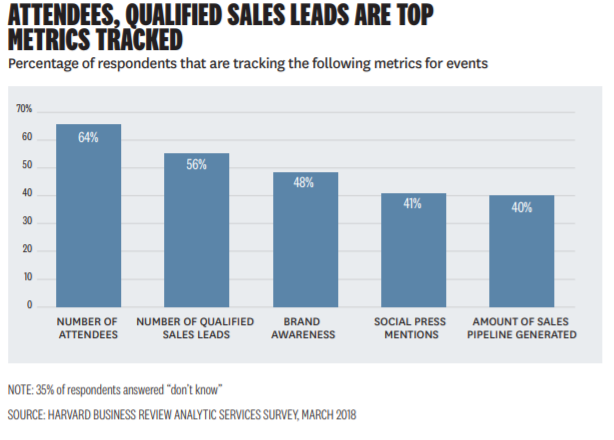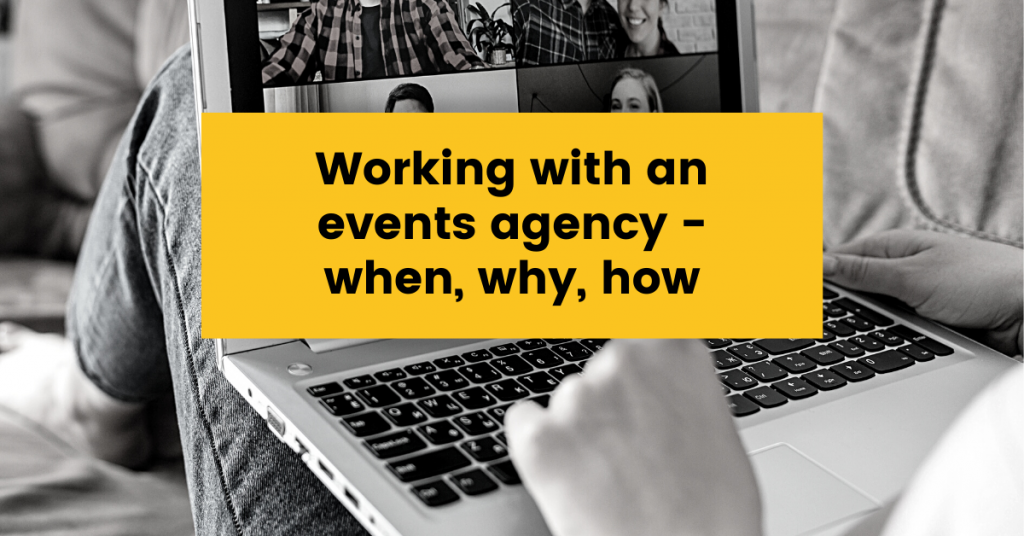Let’s put it out there first: yes, we are an agency that works on events (amongst other things). No, we don’t think you should always work with an event agency because it’s money for us/them. Yes, we have turned down customers when we thought we can’t provide enough added value.
I’ve been an event marketer for 10 years, 4 of which where spent client side, so I understand both sides. I would have loved to have some help with what we did sometimes, whereas other times we didn’t need any external input. And oh, those annoying LinkedIn cold outreaches really need to stop, especially those that are so wrongly targeted – “Thanks for accepting our invitation, we can help with….”. No, remove connection.
Good, now that we know how we stand, let’s take a look at the nitty gritty: when, why and how to work with an event agency to ensure you get the best results.
Events as a marketing channel for your business
First, let’s say you are still considering running an event, whether this is a good idea. Bizzabo found that almost everyone (91%) of marketers believe that in-person events have a significant impact on achieving business results. However, in-person events are still difficult to organise in many areas. The 2020 Demand Gen Report State of Demand Generation Benchmark Survey found that only 19% of respondents are increasing budgets to prioritise event marketing. Most budgets are being shifted towards ABM, content marketing and personalisation.
However, Bizzabo found that 93% of event marketers are looking to invest in virtual events moving forward. In conclusion, whether it’s face-to-face or virtual, events are a great tool of lead generation, nurturing and closing that should be in your belt.
Check out more virtual event statistics here
If it does look like running your own event is a good idea, don’t jump straight into it just now. You’ll still want to review how this fits into your overall marketing strategy and budget. Here’s an article we’ve written on the first steps when considering running an event.
An event agency can cover everything you need: event ideas, planning, logistics, marketing, production, sales. What they will do for you and when you choose to work with them will differ based on the stage your company is in, so we’ve looked at this based on your needs and experience in running events.
No experience – running an event for the first time
Whether your company offers products or services, you most probably have a dedicated marketing member or team. They will take care of ensuring your offering is known to your target audience through a mix of marketing channels. Events, however, tend to be a different beast.
Whilst they are a marketing tool, events need involvement from more functions, such as logistics, production (if there’s an agenda involved), project management, sales (if there’s an exhibition or sponsorship packages involved). These are outside the remit of the marketing function, but you may find the skills (or complementary ones) are present in other functions of your business.
Use an events company? Yes.
If your team has never run an event before, they won’t have the necessary know how. Logistics of a company is different to logistics for an event, where you need to consider the visitor flow, registration process, venue bookings and other. This is similar for marketing, there will be other tactics used for event marketing compared to product or service marketing and sales.
An events company can also help with ideas for the event structure, based on your objectives, they have an ongoing relationship with event service providers (and may even get some volume discounts you can’t access, since you’re just starting working with them) and can save time learning new skills and flows, which they already have.
When?
Get them involved in the planning stages. Present the objectives you’re looking to reach with your event and get their input into the KPIs you should be looking for.
Discuss budget options and compare them to the ROI you estimate from leads and sales generated from the event. This is a very important step. If you’re running an event for the first time, your know-how about budgets and expected ROI might not be spot on. Discuss with the agency and include their input in your final brief.
Include a post event follow up plan, to help integrate it in your overall strategy.
How?
First, designate a Project Manager from your team who will be the point of contact for the agency. Review competitor events to understand what sort of metrics & they have – how many attendees? What types of sponsors do they have, if any? How many exhibitors? What type of speakers? Make a list of ideas you think are interesting and discuss them with your agency. Work together on creating a brief, a set of KPIs and campaign tracking you will both follow.
Then, establish how often you will have catch ups and performance reports. Understand the structure of the team that will manage your event and review their calendar of activities. Decide on a workflow that gives both your team and their team a constant outlook on the results you’re going to have.
Provide clarity on feedback loops – who provides feedback, who makes the final decisions on the different areas (logistics, speakers, agenda, marketing), how long it should take to offer it. For example, you may need 1 day to review the design of a pull up banner, but would need 5 days to review and decide on venue options.
Limited experience in running events
If your team has already planned and organised events before, then you have the internal capabilities to do so. There are 2 questions that need to be answered before deciding whether to work with an agency: did your team perform well and do they have time to do it again?
Also, you might want to consider if your event is different. If your team has organised small webinars and you are now planning a conference, you might want to go back to the previous section, because it might be that your team needs complementing with external output.
Did your team perform well? As mentioned before, your events are a marketing tool, so you will have some objectives they help achieve, like leads for your sales team, brand awareness and/or new revenue. Here are what event marketers are tracking:

Read more on event marketing KPIs here
Check the post event internal document for insights from the previous event that you can include in the next one’s campaign.
Use an events agency? It depends.
If you’re happy with the outcomes or you feel you know what can be done to improve the outcomes and that you’re on the right track, you probably don’t need to work with an events agency. If your event didn’t perform well and you’re not sure what happened, you can review working with a consultant for the strategy, which can be then implemented by your team.
A consultant can also be an events agency who reviews the campaign and results of the previous event and comes up with a new structure, positioning, venue, timing, marketing strategy, follow up after the event, etc, which will ensure you deliver better results this time.
Alternatively, if you pinpoint an area where your previous event could have done better – like an underperforming registration system, not the most interesting speakers, not enough sponsorship packages sold, you can get help from an agency specifically on the areas you need.
Does your team have enough time and bandwidth to run another event? Based on the number of events you run or any other responsibilities your event team may have, it may be the case that your team has too much on their plate.
Use an events agency? Yes.
Whether you choose an events agency or freelancers to help with specific areas of your planning, you should try and supplement your internal capabilities. You can work with a general event agency or look for specific ones – like agencies that handle venue hiring, agencies that take care of logistics, speaker recruitment, lead generation for your sales team or marketing.
When?
Ideally, get the agency involved once you start planning an event. You may also realise throughout the campaign that you don’t have a good solution for an area and get an agency involved at that point, but bear in mind that shorter lead times will diminish the impact they can have. For example, developing a new registration system once half of attendees have already registered can be tricky or even impossible. Changing how they check in at the venue may still be an option.
How?
Brief the agency with all the information you have, including results of previous, similar events. Make sure they understand your workflows, preferences and limitations, so they can easily integrate with them. For example, if you’re only recruiting speakers from the client side, if you want to have locally sourced catering options because you want to support the local business environment or if you only send newsletters once a month, your agency needs to know this.
Designate a project manager who will be the point of contact for the agency, but present your entire event team and their individual responsibilities. Explain clearly what lead times you are working towards, agree on responsibilities (such as who decides on the venue, catering options, event technology, spend of marketing budget), when and how often you give feedback to each other.
Extensive experience and an internal events person/team
Companies that typically run events have the budgets, the (wo)man power and the know-how. Their calendars are often established well in advance, so they can allocate the resources as needed. Of course, things also happen here, like new events being planned with shorter lead times, to take advantage of the market context, having team members leave temporarily or permanently.
Most often, when companies that run events periodically realise they need new resources, they hire them, but there are cases when they’re only needed for a small period of time or when they’re still testing. For example, you might want to incorporate new event technology in your event, but before having a dedicated tech team to work on it internally, you may use external providers to get a head start.
Use an events agency? Maybe, but thread carefully.
If your team is overworked and you bring in an agency to help out, make sure you clearly present this as a temporary help, there to release the workload. Employees can feel defensive about getting help unless this is communicated well, feeling that this means they’re not doing well enough and they will become detractors, so the relationship will suffer.
Also, agencies have their own methods and techniques. Do these synchronise with what you’re doing? Is the agency flexible enough to accommodate to what you’re using or are you flexible enough to let them try out new things?
Then, in order to properly asses how effective the agency is, you’ll need to separate your internal campaign from the agency’s one, so this means understanding how you split the targets. Will the agency work exclusively on one event and your team on the others? Will they only focus on one part, for example venue hiring or PPC ads, for all events? Will the agency activate new market segments that your team isn’t engaging now? Will they use different landing pages and registration flows?
Based on the answers to the questions above, sometimes hiring a freelancer or a contractor can work better, since these can usually coordinate better with your internal team. If you choose an agency, check if they’ve done similar projects and what results they had. How did they ensure integration with the event team? How did they maintain the same quality level as the organising company?
When?
Realistically, this happens once the team is already overworked and are probably behind on work because they can’t keep up. This means that an agency could potentially pick things up quickly. You’ll need to understand what lead times they can work against and what resources can they allocate for your project.
Ideally, you’d want to plan ahead and map out workload for each department. Ask your department managers to understand if they can handle the workload or if they can use the extra help.
How?
Once you’ve decided what the agency can help with, you will work out the how together with them and the team/department they will provide input to. Your goal is to ensure the integration with your company is seamless, easy and minimises friction. Also, since you’ll be working with an agency who complements your existing efforts, you’ll want to clearly establish privacy concerns first.
Decide their KPIs and how these are tracked, so they don’t overlap with your internal team’s effort. Set responsibilities and who takes the final decision on different aspects – do they have a set budget and need to work to that however they decide or do they need to approve each part with you? Do you provide them with a brief and they deliver to it or do you check progress on a weekly/monthly basis?
To your clients, be they event attendees or sponsors, it doesn’t matter who organises the event, as long as their experience with your brand stays the same, so the agency you work with must match your standards of quality, tone of voice and use your design assets in the same way you’d do so yourself.
Whether you choose to work with an event agency or not, it will be work in progress, so prepare to learn and adapt on the go. Do you have any success stories (or less successful ones) from working with event companies? Let us know in the comments!
Get the next video and/or article in your inbox. Sign up to the newsletter:
About the author:

I am Raluca Apostol, Founder and Account Director at eMarketing Stars and I have marketed over 60 events in the last 9 years, with attendee numbers ranging from 100 to 13,000, in small and big teams, in B2B and B2C, on 3 continents and helped deliver up to £4,000,000 in revenue.
I am passionate about events, lead generation and monetisation. If you want to reach out, you can find me on LinkedIn here.


